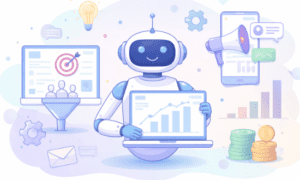AI has become the new normal. Despite the technology’s relative infancy and the fact that it still conjures up immense moral and ethical debates at every turn, many of the largest companies in the world have already given in to its allure. They are currently using AI within their own systems.
This is a more private shift for some, as AI is utilized to streamline internal operations. For others, it is a more public shift, with companies such as Google or Meta not only exhibiting AI results for users but also proudly serving as large-scale advertisements for it.
In this way, it isn’t difficult to discern how AI has gone from something met with widespread disdain and resistance a few short years ago to something now a part of businesses worldwide. With constant exposure to it and the technology’s ability to streamline business systems, complete tasks in a much shorter time, and reduce funds and labor spent, AI agents have become an increasingly popular choice.
AI Agent Strategy is a critical tool for modern businesses looking to enhance operational efficiency, drive innovation, and deliver exceptional customer experiences. Companies with a clear AI agent strategy gain a competitive edge, streamline workflows, and are better prepared for the future of automation.
Defining AI Agent Strategy
AI agents are public-facing agents powered by AI that interact with consumers. However, any AI agent will only be as good as a human in providing prompts and directives to it. Despite its co-opting of the pop-cultural and familiar term of ‘artificial intelligence,’ what is utilized in the real world today is far less actually intelligent than many realize. These tools are incapable of autonomous thought, but are more like highly advanced digital blenders; they consume exorbitant amounts of data and then respond to user prompts with corresponding information.
This is not to undermine the value of these tools, but rather to illustrate how crucial it is to have a clear strategy moving forward once you incorporate AI. It’s not as if using AI will magically streamline your business’s operations; it is a tool, the same as any other, whose ultimate value will be determined by how well it is operated.
AI Agent Strategy Is the New Norm
While some resist the transition to AI, many have ultimately been converted to using it as a tool out of fear. If every other company you are competing with uses AI, then the moral and ethical issues surrounding it become far less pressing. Instead, it becomes a question of whether a company is willing to embrace AI or ultimately become outdated.
Filmmaking is one of the most fascinating industries, and the AI revolution is challenging. Producer Jason Blum recently said of AI in movies, “It’s here to stay. It’s very important to use it ethically and legally, and for studios and guilds to protect the copyright of the artists. But if we in Hollywood stick our heads in the sand and don’t use it at all, we’re going to cede content creation to other people.” [Yahoo, 2025]
This illustrates the fear that has driven many across multiple industries to embrace AI as a tool, specifically, AI Agent Strategy; they don’t want to be left behind.
Benefits for Businesses
AI Agent Structure offers numerous benefits to companies, including:
Integrating AI Agents Into Existing Workflows
The company and its leaders must know precisely how their systems function to seamlessly embed AI agents into business operations and marketing strategies. AI agents can complement existing systems for measurable performance gains, but require precise directives to optimize workflow efficiently.
To assist with this, the AI Agent Process Assessmenttool is a step for companies to evaluate their readiness and plan AI adoption. By assessing your business’s current structures, this tool can gauge how AI agents can enhance your strengths and fix your weaknesses.
FAQ
What is an AI Agent Strategy?
A framework that guides businesses in implementing AI agents to optimize processes, enhance decision-making, and improve customer engagement.
How do AI agents boost operational efficiency?
They automate routine tasks, provide real-time insights, and enable smarter, faster decisions.
Which industries gain the most from AI Agent Strategies?
Finance, healthcare, marketing, e-commerce, and other sectors benefit through efficiency improvements and enhanced customer experiences.
How can companies begin building an AI Agent Strategy?
Start by assessing AI readiness using the AI Agent Process Assessment tool, then design integrations aligned with strategic business objectives.



































